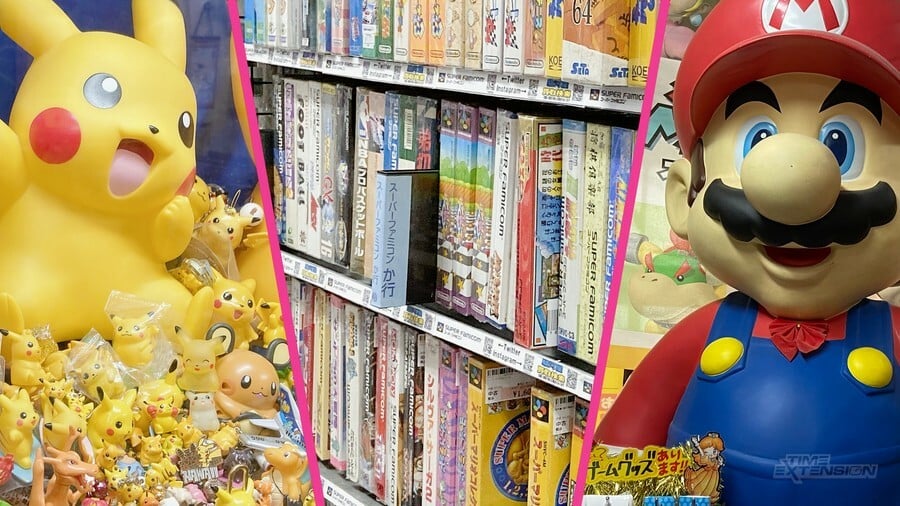
Japanese games dominated the international market in the '80s and '90s, with many of the most prominent companies developing their iconic games within Tokyo. Therefore it’s no surprise that Japan’s capital likely houses the most retro games per square mile. Whether you’re looking for a boxed copy of Final Fantasy VI, the several One Piece games released on the WonderSwan, or even the mouse for Mario Artist on the N64, you can undoubtedly find it in Tokyo.
Exploring Japan’s largest city for your favourite classic games can be daunting and time-consuming. It’s easy to eat up a large part of your day just perusing dusty aisles filled with loose Famicom carts. Newcomers to retro hunting in Tokyo might even experience choice paralysis. Should you pop into every used game shop? Is it worth stepping outside of Akihabara to find retro games? What if you’re looking for a more obscure console than the Famicom or PlayStation? As someone who’s lived in Tokyo for years and spent hours perusing the games of yore, I’ve assembled this helpful guide for retro game hunting in Tokyo.
Recommended Shops
Dozens, if not hundreds, of shops in Tokyo, carry at least a few retro titles. Everyone has their favorite chains or even mom-and-pop shops, but I’ve assembled a list of the most comprehensive shops. Whatever you're looking for hides somewhere in these stores.
Surugaya
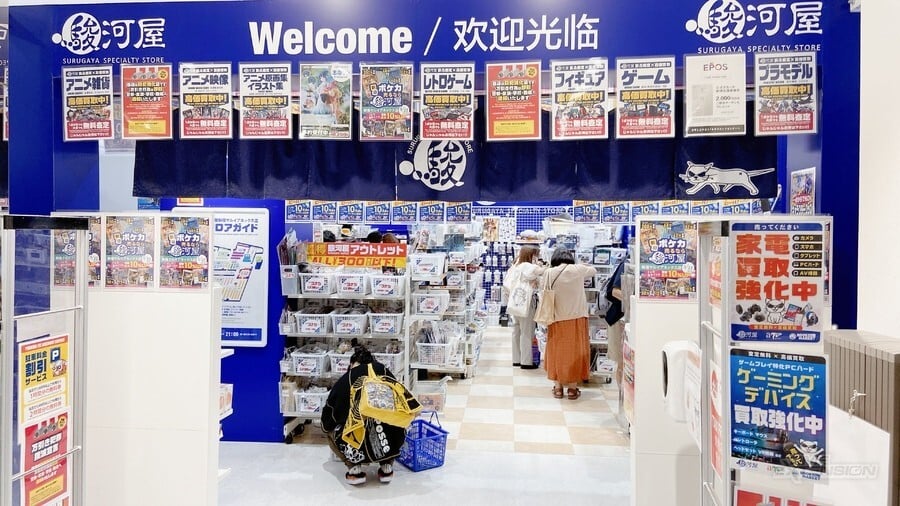
The Shizuoka-based used good shop is a haven for all things under the otaku umbrella. Thousands of plushies, toys, books, CDs, and games are in a single location. Due to not being game-specific, many people may pass over these shops, but doing so would be a dire mistake for retro collectors. Hiding behind all those Gundam models and anime BluRays is an incredible collection of old games, and at affordable prices. Surugaya’s selection is more comprehensive than other recycle shops, and the prices are often better than the more popular stores. When I received my Analogue Pocket this year and wanted to fill up on some retro Game Boy titles, my first thought was to swing by the Surugaya shop within Shinjuku’s Marui Annex department store.
Shinjuku is a major party and recreation area of the city and is home to the famous nightlife hotspot of Kabukicho. Yet just a ten-minute walk from the neon lights of the area’s kinetic entertainment district is a shop filled with treasures like boxed Japan-only Game Boy titles. A place where you can hold a pristine copy of Policenauts, or feel the heft of a launch Dreamcast with the late Hidekazu Yukawa emblazoned on the box. While games from Japan’s more popular consoles such as Famicom, Super Famicom, and PlayStation dominate recycle shops, Surugaya has a solid selection of everything from PC Engine to WonderSwan. Some of them are a bit hidden, with their games stacked up between aisles, so you may have to be eagle-eyed to find them.
Despite being in a major part of Tokyo and the middle of one of the city’s biggest shopping hubs, the prices won’t make your eyes pop out. When I made my mad dash to grab some Game Boy titles to try out on my Analogue Pocket, I managed to pick up games like Sakura Wars GB and Tetris DX in the box for less than 1000 yen each. I grabbed WarioWare Inc. at a bit higher price, around 1600 yen, but it was worth it when I opened up the box to discover that all the stickers in the instruction manual were intact. It truly felt like grabbing a brand new copy of a twenty-year-old game!
While the Shinjuku Surugaya shop is a catch-all for all types of merch, the Surugaya stores in Akihabara are split up by what they sell and dot the main commerce section. The Surugaya games shop in Akihabara may seem quaint on the outside, but it is undoubtedly my favourite spot in the area for retro games. That’s saying a lot considering the competition is just a few blocks over. Yet like with the Shinjuku store, it strikes an excellent balance between variety, stock, and pricing.
The game section may seem much smaller than the Shinjuku store, but the games are just as plentiful, if not more so. They only had to sacrifice aisle space to cram in more retro goodness. The shop prioritizes boxed copies over loose carts or CDs, so collectors who want the whole package will feel at home. The Famicom and Game Boy selections are particularly impressive for hardcore Nintendo fans. It houses quite a few oddities, such as titles from the Sega Pico and the Nintendo 64 Disk Drive.
Allow me to cheat a little bit and add in the Surugaya shop from Tokyo’s neighboring metropolis: Yokohama. Located in Marui City Yokohama, this shop is similar to the Shinjuku store in layout, but I would argue dwarfs it in terms of the sheer amount of games it carries. I’ve never seen so many Sega CD or Neo Geo Pocket games in one shop. It’s not too far from Yokohama Station, so it’s easy to pop into if you visit the city.
Super Potato
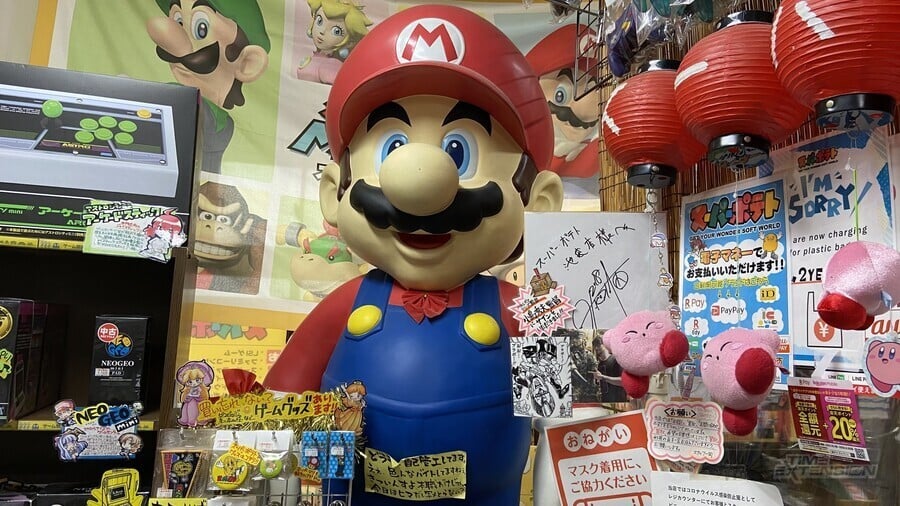
This guide wouldn’t be complete without mentioning the country’s most popular retro games store. Thanks to its silly name, unparalleled selection of games and creative store layout, Super Potato has established itself as a landmark in Akihabara. Visitors to the city easily become starstruck when faced with rows after rows of old school games in beautiful condition or ponder the peculiar display such as a giant statue of Fox McCloud from Star Fox.
Among Tokyoites, the shop does have somewhat of a negative reputation due to its higher, tourist-focused prices. Yes, you can probably find a copy of Chrono Trigger cheaper at a random Book Off in the city, but Super Potato serves as a one-stop shop for most people looking to grab a few retro titles or even a retro gaming museum for those who just want to look around without opening up their wallet.
The main store claims to be five floors, but only two carry their massive stock. Between each floor are staircases adorned with classic gaming ads. My favourite is a stoic Takuya Kimura, the star of Sega’s Judgement series, advertising the Game Boy. Floor three is where Nintendo fans will find their place, as the company’s decades-long history is laid out among the aisles. There is even a sizable selection of Virtual Boy titles on sale for around 2000 to 3000 yen. Other fun Nintendo items include Wild Gunman with the realistic revolver light gun, various Game & Watches that look straight out of 1981, and copies of Pokémon Gold and Silver with the batteries replaced. Trust me, Pokémon fans adore that attention to detail. This floor also has a great number of Saturn and Dreamcast titles.
The fourth floor is the home to PlayStation and more recent retro titles. Scattered around this floor are rare or once exclusive items, like Japanese Club Nintendo prizes or out-of-print limited editions. This floor also has a Game Boy vending machine, where you put in 500 yen and get two random Game Boy carts. I doubt Pokémon is in these things, you won’t know until you insert a coin. The final floor isn’t a store but instead a mini arcade with a handful of retro cabs. There is also a small Showa-era snack shop, adding to the nostalgia.
A major part of the shop’s appeal isn’t solely the number of games, but instead, the overall atmosphere and other knick knacks that line the walls. CRTs flicker as retro commercials for games like Pokémon Red and Green play. Standees and statues that decorated gaming sections in the '90s find a second life here. The Naked Snake statue from Metal Gear Solid 3 became an attraction in and of itself. Walking through so much gaming history like you’ve gone back in time, and this is where Super Potato excels as an unofficial retro gaming museum. It is tremendous fun simply looking around without spending a single yen.
The Akihabara shop gets all the attention, but don’t ignore the Ikebukuro location. Although only one floor and much smaller, it has a solid selection of hardware and a few exclusive gems. For one, the Virtual Boy kiosk in the Ikebukuro shop actually works! You can play these games in their red and black glory. The Ikebukuro store also has a working FamicomBox. Originally installed in hotels, users could cycle through games included in the box after paying a fee. You can even use the light gun to play some Duck Hunt.
BEEP
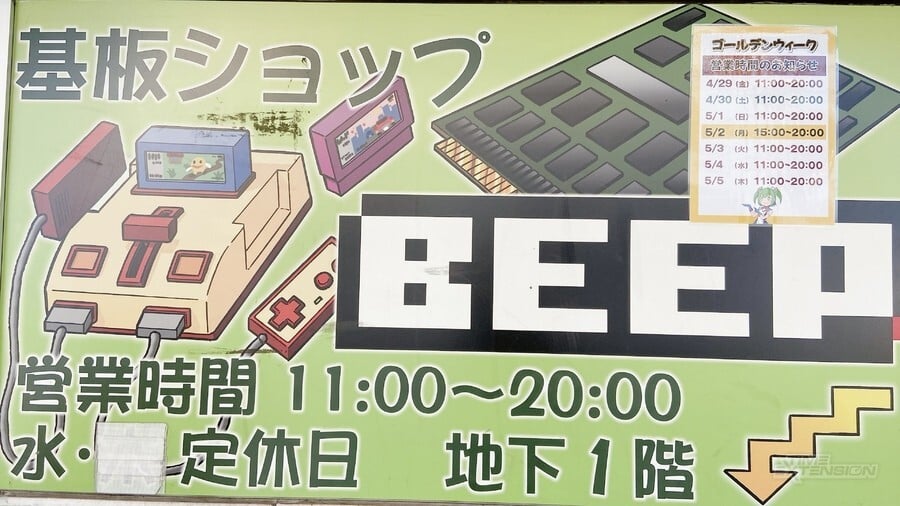
This Akihabara shop focuses less on quantity and more on catering to a specific niche: fans of old Japanese PCs. You might not stumble across Sharp X68000 titles at Super Potato, but you’ll find more than enough at BEEP. Aisles of retro computer games that never left Japan line take up a large portion of the store. BEEP also has a tremendous amount of hardware with glowing attract screens. On my last visit, I was surprised to see Donkey Kong 3 running on a PC-88. I saw that beautiful red color that adorned the MSX and other Japanese PCs in the 1980s. FM Towns, MSX, PC-98; for many, this may be the first time to come face to face with these important pieces of Japanese gaming history.
Super Potato feels like a retro game museum, yet BEEP feels like a retro Japanese computer exhibit. I doubt many other places in Tokyo let you touch these decade-old computers, or look at vintage mags about doujin soft. BEEP carries dozens of vintage PC games, so if you’ve got the hardware, you can walk out with a game that looks new. Although largely unknown to the west, the Japanese PC scene in the 1980s was prolific with many high-profile developers. Once upon a time, Square Enix and HAL Laboratory pushed out titles exclusively for these computers.
Even if you’re not interested in old Japanese PC games, BEEP prides itself on its rare items. Soundtracks, advertising displays, and unusual paraphernalia eventually end up in BEEP. One of the newer items is a Pokémon Center exclusive Game Boy that only launched in Hong Kong. It’s not something you’re going to find elsewhere. Other fun items include a framed poster of the arcade Punisher game, a Snoopy Game & Watch, an orange and black Daiei Hawks N64, and the ill-fated 3D glasses for the Sega Master System. If it’s weird, it’s here.
BEEP even carries imported games from the west, ranging from Atari 2600 to Game Boy Advance. A random mix of games, but it’s always fun to see western games somehow end up in Japan. BEEP also sells obscure arcade boards and parts, so if there’s some mahjong arcade game you’ve got your eye on, BEEP is probably your best shot. BEEP stands right next to the Akihabara Surugaya game shop, so if you’re visiting one you might as well pop by the other.
Trader
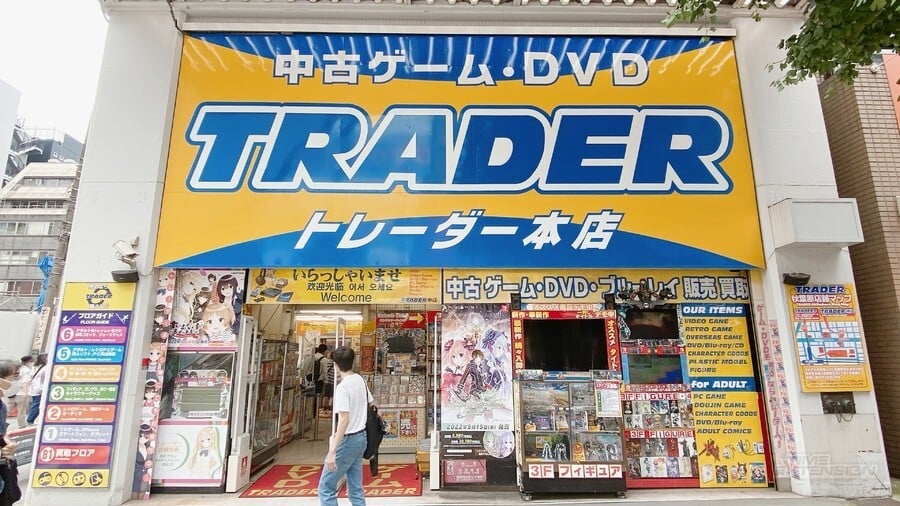
This store diversifies its lineup by carrying both retro and newer titles. Other floors contain figures, anime, CDs, and other otaku goods. But if you’re not interested in new goods, the main shop on Akihabara’s major shopping street sells hundreds of retro games on its second floor from a variety of platforms.
While the selection may be smaller than the Akihabara Surugaya store or less unique than BEEP, both only a few minutes walk away, Trader stands out due to its reasonable pricing and a broader selection of more mainstream titles. Here is where you can find your boxed copies of Game Boy Pokémon titles, SNES JRPGs, or clean PlayStation cases without breaking the bank. It’s the only place I remember coming across a Virtual Boy in a box. Plastic cases protect older 8-bit and 16-bit games, which help keep them look good as new. Trader also seems very Sega friendly as its stock of Genesis, Saturn, and Dreamcast titles easily best even some of the more popular shops. Something is comforting about seeing all the Sakura Wars titles right next to each other on a shelf.
Like BEEP, Trader also carries some imported titles from the west. Instead of having a random selection, most of it focuses on newer Switch and PS5 titles. You may see a retro western title, for example, WWF: No Mercy for the N64. These may not interest most people from overseas, but hardcore collectors in Japan appreciate the convenience.
With such a solid collection and appealing prices, don’t be surprised if you walk out with more than a few titles. If you want to see some absurdly expensive titles, there are dozens behind glass cases. The priciest title on my last visit was a boxed copy of Lickle, also known as Little Samson in English, for a whopping 94,000 yen. Or you can buy the much more affordable Japanese version of Plok! for 38,880 yen. This section resembles an exhibit more than a shop. Other intriguing items behind glass include some Final Fantasy WonderSwans, copious Neo Geo Pockets, and a Game Boy Advance themed after Gundam’s Char Aznable.
Nakano Broadway
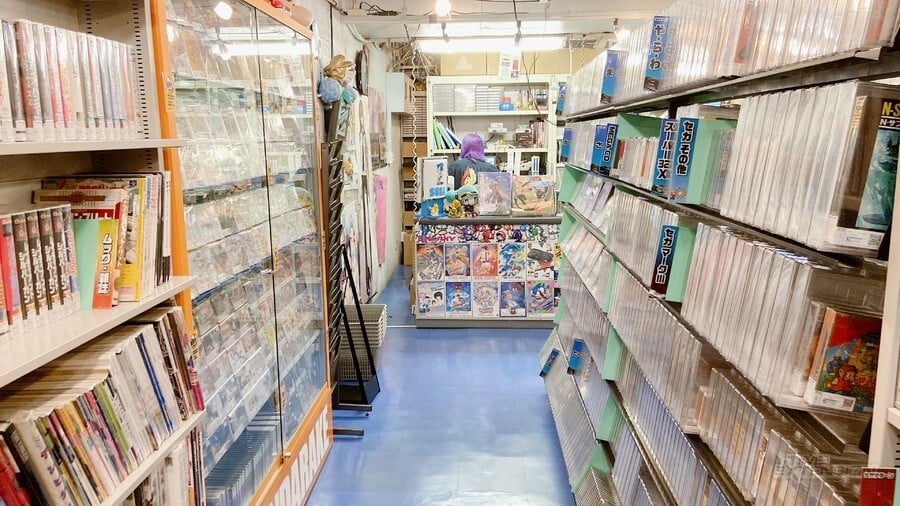
Often described as a mini Akihabara, Nakano Broadway is a giant collection of shops in Tokyo’s suburbs not too far from Shinjuku. While the towering buildings and colorful ads of Akihabara make it seem very much like the future, Nakano Broadway is more concerned with the past. The giant shopping complex contains dozens of small shops that sell retro items. Nakano Broadway is known for its expansive array of anime and manga goods, but retro game aficionados will find more than enough interesting places to peruse.
With three main areas and tiny shops jammed right next to each other, it can be difficult to parse who has what. There are a few key shops to keep an eye on. Lanshinbang Audio Visual Shop contains a small yet impressive supply of retro hardware and software. There is one main aisle, with some other random goods on a shelf nearby. The majority of games are complete in the box, so collectors who aren’t happy with just the cart should enjoy this store.
Popular retro consoles like Famicom, Mega Drive, and PlayStation are well represented, but the shop also carries other obscurities like boxed MSX games. I saw a boxed version of Castlevania for MSX on my most recent trip. Lashinbang also has a decently sized section for retro handheld hardware. Game Boy, Game Boy Pocket, Game Boy Color, and Game Boy Advance were all available in the box. The audio part of the shop’s name comes from its CD section, with a special area just for game soundtracks. Here you will find rarer OSTs from classic titles like Ocarina of Time, Bomberman World, Viewtiful Joe, and many more.
The largest retro game shop in Nakano Broadway is undoubtedly Mandarake Galaxy. Nakano Broadway is home to many Mandarake shops, a chain of used shops found all over Tokyo. Galaxy is the one that retro game lovers should prioritize. Aisles and aisles of retro games fill the store, and like Trader most are in plastic cases or behind glass. Galaxy goes for the deep cuts with its catalogue highlighting games that most shops won’t carry. It’s home to the largest collection of WonderSwan games I’ve ever seen, and other obscurities like the 3DO or PC-FX have dozens of games sitting on the shelves.
Although Galaxy’s selection is much deeper, I would say that Lanshingbang overall has better prices. As a point of comparison, a boxed copy of Joy Mecha Fight for Famicom was 2750 yen at Lanshinbang and 5940 yen at Galaxy. Maybe the Galaxy boxed copy is cleaner, but at nearly half the price I’d rather pick it up at Lanshinbang. If you’re looking for something truly obscure though, Galaxy is far more likely to have it.
There’s also Game Station, which specializes in western game goods. It’s almost like visiting a GameStop in Japan, but at even higher prices. Game Station carries some older items that you might not be able to find easily in the west, however.
If you’re into not only retro games but retro toys, several figure shops carry old-school toys from the '80s, '90s, and 2000s featuring characters from Mario, Pokémon, Street Fighter, Dragon Quest, and others.
Book Off and Hard Off
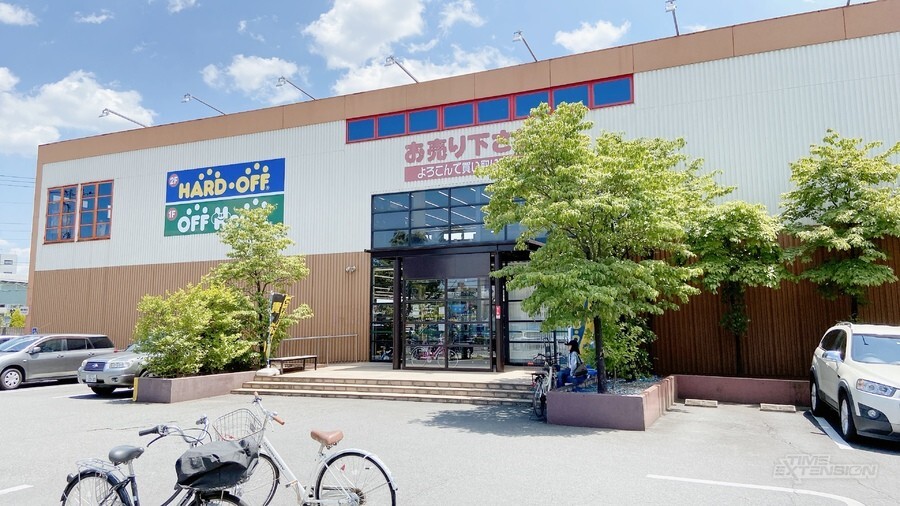
Book Off and Hard Off are the most famous used goods chains in Japan. Many of them carry an abundant selection of retro games, often at the best prices. Hard Off is famed for its 'junk' corner, where you can buy games for as low as 100 yen in various states of disarray and working conditions.
For retro game fans who live in Tokyo, hopping into a random Book Off or Hard Off is a common activity. Shops cycle out their stock frequently, so even a single location is worth checking out every few weeks. Popping by a Book Off and wondering what you’ll find is part of the fun. For tourists, however, it can be hit and miss if you are looking for something specific.
A Book Off could contain hundreds of retro games from a wide swath of consoles, or just three boxed copies of Yakuman for Game Boy. There are Book Offs in touristy areas like Akihabara, Shinjuku, and Ueno, but their prices are far higher than what you would find at one off the beaten path in Tokyo. Hard Off’s Tokyo locations are minuscule compared to the massive landmark-style shops in the countryside.
If you don’t mind venturing into the suburbs, the Hard Off in Oizumi should make retro collectors happy. If you’re just visiting Tokyo and come across a Book Off, it’s worth stopping by. If you’re in the city for only a short time, the previously mentioned retro game shops are more likely to be more comprehensive.
And more…
This list is by no means complete. There’s Retro Game Camp, Friends, other Mandarake shops, and many other smaller stores that might carry what you want. Knowing where to go is one part, but it’s important to think carefully about what you want to buy and how much you’re willing to spend.
The balance between regret for skipping something and buyer’s remorse is a delicate one. My advice is that if you see something you want at a decent price: buy it. You could surf Mercari to see if you can find the game for 400 yen cheaper, or hop back and forth between stores and try to compare prices. For many, time is more precious than money, so grab what you want when you see it.
Most importantly, enjoy being surrounded by hundreds of classic titles that you may have heard about for years, but never got to see in person. Retro game hunting in Tokyo isn’t simply about buying things off a checklist, but appreciating the history of video games in the city where many titles were created from scratch. Even if you walk out of a store empty-handed, the experience of visiting a place that cares about preserving gaming history and passing it on to a new generation is rewarding enough.
Tokyo Game Life is a Tokyo-based video game podcast focusing on Nintendo and gaming culture in Japan's capital. Tokyo Game Life is available on your favourite podcast app.






Comments 8
Thanks, perfectly timed article. Planning a trip to Tokyo and want to go to the non-tourist-y areas for games. Hopefully the travel restrictions lift soon!
This is something I would love to do, but I don’t think I will ever have a suit case big enough
Where’s the Amiga games? ;P
Absolutely amazing, one day I will get there. With a big suitcase!! Lol 😆
Damn, things move fast. Wanted to recommend a great store near Super Potato but it's now a World Mobile on google maps. I was lucky to come in during a sale and scored a lot of PS3/vita games for such an insane price I asked the cashier if there was not a mistake.
Google maps also shows the creepy maids are still crowding the streets (if you went anywhere near Super Potato you know what I am talking about) though, so some things stay the same.
@Axelay71 @Gerald Forget about the suitcase. Just go to the post office, it's easier in the end.
@Muriustar good point lol
@Muriustar good point, although I would probably need to hire a plane or a boat 🤣
Show Comments
Leave A Comment
Hold on there, you need to login to post a comment...